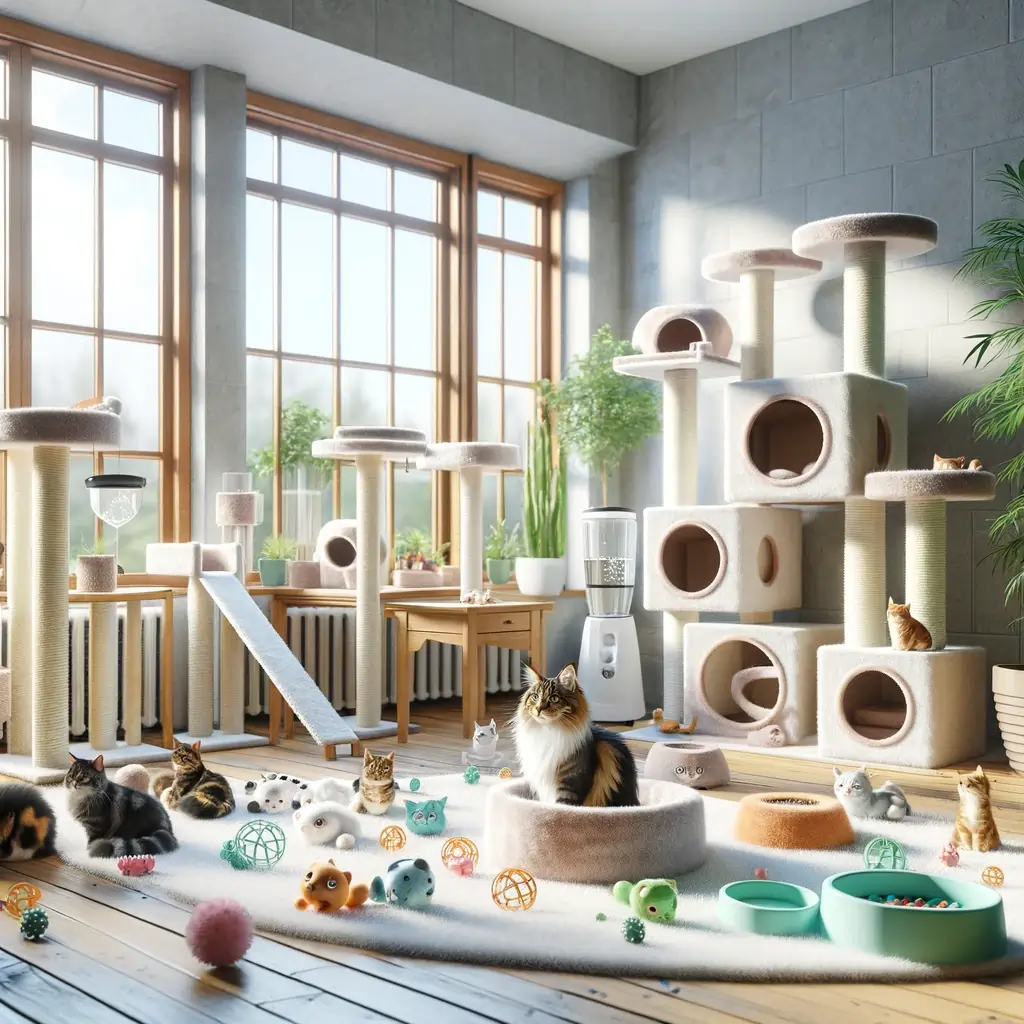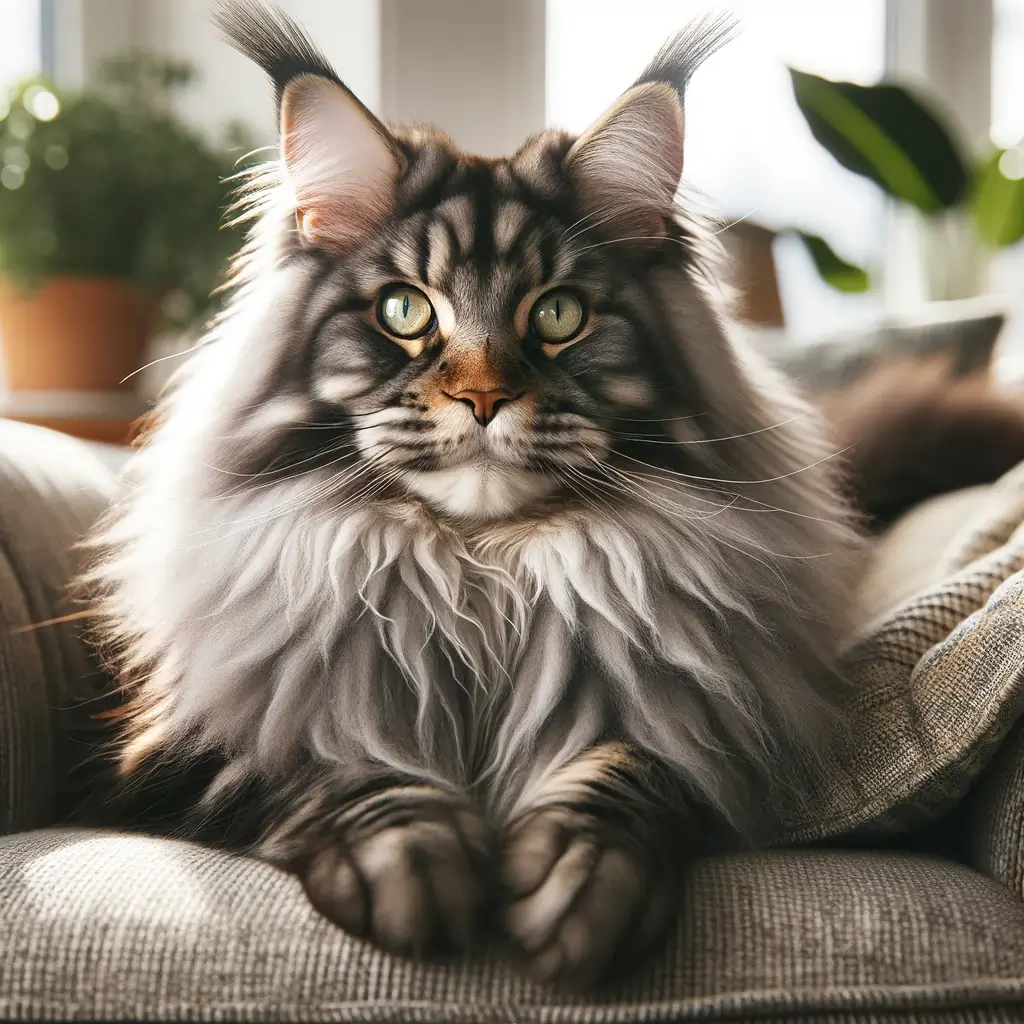If you find yourself asking, “Why is my Maine Coon small?” you’re not alone. Many cat owners are puzzled when their Maine Coon doesn’t grow as big as expected. In this article, we will explore the possible reasons behind their small size and provide insights on how to encourage their growth.
Factors Affecting Maine Coon Growth
When it comes to the growth of a Maine Coon, several factors can influence their development. Understanding these factors can help you better care for your Maine Coon and ensure they reach their full size.
Genetics
Genetics plays a significant role in determining the size of a Maine Coon. These cats are known for their large size, and their genetic makeup can influence how big they grow. If the parents of a Maine Coon are both large and come from a long line of larger cats, there is a higher likelihood that the kitten will grow to be a sizable adult.
Breed
Maine Coons are a specific breed of cat known for their large size. Compared to other cat breeds, Maine Coons tend to be larger than adults. This breed has a stocky build and can weigh between 15 and 25 pounds on average.
Gender
Gender can also impact the growth rate of Maine Coons. Generally, male Maine Coons tend to be larger than females. While both male and female Maine Coons can reach impressive sizes, male Maine Coons often grow to be larger and heavier.
Breeders
Breeders play a critical role in guiding the growth of Maine Coon kittens. Experienced breeders prioritize proper nutrition, healthcare, and socialization to ensure the kittens grow into healthy, well-developed cats. They carefully select the parent cats to promote desirable traits and assist in the growth of the kittens.
Possible Reasons for Small Size
If your Maine Coon is smaller than expected, there could be several reasons for their small size. It’s important to understand that Maine Coons are known for their large size, so a small Maine Coon might raise concerns. Let’s explore some of the possible reasons behind a small Maine Coon.
1. Slow Growth Rate
Maine Coons have a slower growth rate compared to other breeds. While they reach their full size around 2-4 years of age, it’s not uncommon for them to take longer to reach their full potential. So don’t worry if your Maine Coon seems small in their early stages of development.
2. The Runt of the Litter
If your Maine Coon was the runt of the litter, they might be smaller than their siblings. The runt is the smallest and weakest kitten in the litter, and sometimes they have a slower growth rate. However, they can still catch up in size as they grow older.
3. Potential Health Issues
Health issues can also contribute to a Maine Coon’s small size. If your cat is not eating properly or has trouble digesting food, they may not be getting the necessary nutrients for healthy growth. If you’re concerned about your Maine Coon’s size, it’s best to consult a vet who can assess your overall health and provide proper guidance.
Typical Weight Range for Maine Coons
While Maine Coons are known for their large size, their weight can vary. On average, male Maine Coons weigh between 13-18 pounds (around 6-8 kg), while females weigh between 8-12 pounds (around 4-6 kg). However, there are exceptions, and some Maine Coons can weigh up to 25 pounds (around 11 kg).
It’s important to note that the size of a Maine Coon could also depend on factors such as genetics, the breed line, and the size of their parents. If your Maine Coon is from a purebred Maine Coon line, they are more likely to reach their full size. However, if they have mixed-breed ancestry or come from a smaller lineage, they may remain smaller in size.
Ways to Support Growth
To ensure the healthy growth of your Maine Coon, there are several key factors to consider. Proper nutrition, veterinary care, and creating a nurturing environment are all essential for supporting your cat’s growth.
Nutrition
Good nutrition plays a crucial role in promoting healthy growth for Maine Coons. These cats require a balanced diet that is rich in essential nutrients, including proteins, fats, vitamins, and minerals. Consult with your veterinarian to determine the best cat food for your Maine Coon based on their age, size, and specific dietary needs. Additionally, ensure that your cat has access to fresh water at all times.
Veterinary Care
Regular veterinary check-ups are important for monitoring your Maine Coon’s growth and overall health. Your veterinarian can guide on vaccinations, deworming, and preventive care measures to ensure your cat remains healthy and free from any potential growth-related issues. They will also be able to identify any underlying health conditions that may be affecting your cat’s growth rate.
Creating a Nurturing Environment
A nurturing environment is critical for supporting the growth of your Maine Coon. Provide a comfortable and safe space for your cat to thrive, with plenty of toys and scratching posts to encourage exercise and mental stimulation. Additionally, ensure that your cat has a quiet and cozy area to rest and relax. Creating a positive and stress-free environment will contribute to their overall well-being and growth.
Growth Milestones
Maine Coons typically experience a growth spurt during their first year, reaching around 12 pounds by the age of 6 months. However, it’s important to note that the growth rate can vary depending on factors such as genetics, breed, and gender. While most Maine Coons reach their full size by the age of 3 to 5 years, some may continue to grow until they reach 15 to 25 pounds. Keep in mind that individual cats may have different growth patterns, and it’s essential to monitor their development closely.

Understanding the Maine Coon’s Size Potential
When it comes to Maine Coons, their size is a topic of fascination for many cat lovers. These majestic felines are known for their large size and impressive physical presence. However, it’s important to note that not all Maine Coons will reach enormous proportions. While they are generally one of the largest domesticated cat breeds, it is not uncommon to come across smaller Maine Coons as well.
Maine Coons tend to have a slow growth rate, and it can take them up to four years to reach their full size. On average, a fully grown Maine Coon can weigh anywhere from 15 to 25 pounds, with males usually being larger than females. However, it’s worth mentioning that the size of a Maine Coon can vary depending on various factors such as genetics, diet, and overall health.
If you have a Maine Coon kitten that seems small or is not growing as quickly as you expected, it’s essential to keep an eye on their overall health. If your Maine Coon is showing signs of being underweight or not eating enough, it is crucial to consult with a veterinarian to rule out any underlying health issues.
Another factor that can influence the size of a Maine Coon is their lineage. If your Maine Coon is a mixed breed or a result of breeding with smaller cats, they may not grow to be as large as purebred Maine Coons. However, even smaller Maine Coons can still exhibit the breed’s distinctive features and wonderful personality traits.
In comparison to other cat breeds, Maine Coons are still considered to be quite large. On average, they are larger than most domestic cats, and their size can rival that of some small dog breeds. This impressive size, combined with their friendly and sociable nature, is what makes Maine Coons one of the most sought-after cat breeds.
It’s important to remember that not all Maine Coons will grow to be massive in size, and that’s perfectly okay. Each Maine Coon is unique, and their size should not be the sole measure of their worth or beauty. Whether your Maine Coon is small or large, they will still bring joy and companionship to your life.
Conclusion
Throughout this article, we have explored the fascinating world of Maine Coon cats and their growth patterns. It is important to note that the Maine Coon is not only one of the largest domesticated cat breeds but also known for its gentle giant nature. Maine Coons are often much bigger than other cats, with some females weighing an average of 8 to 12 pounds, and males weighing between 13 and 25 pounds.
If you have a Maine Coon kitten, it may seem small initially but don’t worry. Maine Coons have a slower growth rate compared to other breeds, and it takes time for them to reach their full size. It’s important to ensure that you are feeding your Maine Coon a balanced diet and providing them with regular veterinary care to support their growth and overall health.
Remember, every Maine Coon is unique, and the size of your cat may vary depending on various factors such as genetics, gender, and overall health. It is also worth mentioning that if your Maine Coon seems smaller than expected, it doesn’t necessarily mean that there is a problem. However, if you have concerns about the size or growth of your Maine Coon, it is always best to consult with a veterinarian for further guidance and advice.
FAQs
Q: Why is my Maine Coon small?
A: There could be several reasons why your Maine Coon is smaller than expected. It may still be a kitten, as Maine Coons grow slowly and may take up to five years to reach their full size. Another possibility is that your Maine Coon is not eating enough or has a health issue affecting its growth.
Q: How big do Maine Coons usually get?
A: On average, adult Maine Coons can weigh between 10 to 25 pounds. Female Maine Coons tend to be smaller and weigh between 8 to 12 pounds, while male Maine Coons are typically larger and can weigh between 15 to 25 pounds.
Q: What are some possible reasons why my Maine Coon is still small?
A: It’s possible that your Maine Coon is genetically predisposed to be smaller in size. Additionally, inadequate nutrition or health issues could also be contributing factors to its smaller stature.
Q: Why is my Maine Coon not growing as expected?
A: If your Maine Coon is not showing signs of growth or is growing at a slower rate than usual, it might be due to various reasons such as genetics, diet, or health conditions. Consulting a vet can help determine the underlying cause.
Q: How large can a Maine Coon cat grow?
A: Maine Coons are known to be one of the largest domestic cat breeds, with some individuals reaching impressive sizes. However, the average size of a Maine Coon can vary between 10 to 25 pounds, depending on factors like genetics, gender, and overall health.

Hey guys, My name is Simon Smith. I’m from Canada and live near Victoria
I live with my sweet family and have 20+ Ragdolls of different types. I love them as my own children. My profession is as a hotel manager.
I love to keep Ragdolls and grow their breeder case. I have 7 years of experience.
I’m an expert in cat care. So, I’m here to provide you with new information about my cats daily. This is my personal blog website, so I request that you kindly visit our site daily.
If you’re a Ragdolls lover and you have any questions or confusion about cats, text me on the Contact Us page or Gmail.
Thank u
